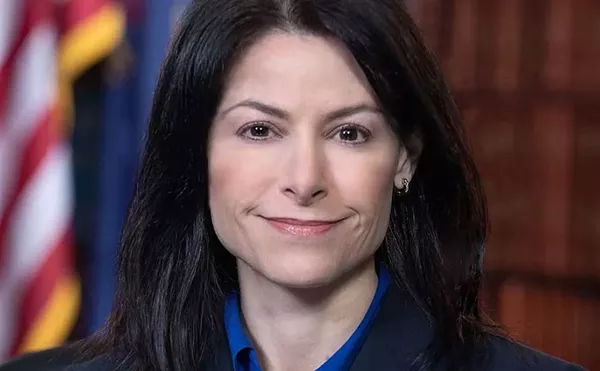
Audio By Carbonatix
[
{
"name": "GPT - Leaderboard - Inline - Content",
"component": "35519556",
"insertPoint": "5th",
"startingPoint": "3",
"requiredCountToDisplay": "3",
"maxInsertions": 100,
"adList": [
{
"adPreset": "LeaderboardInline"
}
]
}
]
Usually, this column, in my sweet and gentle way, screams at you to pay attention to one or more of the many messes in our city, state and nation. But not all is gloom and doom, and there are a few glimmers of hope to keep in mind, even as the evictors carry your mattress out to the pavement.
First of all, it may not seem like it, but President Obama deserves a lot of credit for the quietly masterful way in which he's handled the auto crisis. What he did (and the way he did it) was so subtle it may have escaped your notice. For it could have been much, much worse.
I've been watching economic trends and human behavior for a long time. If General Motors and Chrysler had been forced to declare bankruptcy in December, when they first came begging to Congress, we probably would have faced something like the Great Crash of 1929.
The collapse would have sent the stock markets, then in a state of controlled panic, over the cliff. What we would have had then would have been a much different bankruptcy scenario than we are seeing today. Consumers would have been very unlikely to buy cars from Chrysler or General Motors at any price. Major suppliers would have failed as well, spreading the arc of destruction to Ford Motor Co., even Toyota. We would be in an authentic depression now.
Yet that didn't happen, for a couple reasons. First of all, George W. Bush deserves a little credit. Yes, he was probably the worst president in history. But in his last weeks, he did throw $17 billion at a stricken Chrysler and General Motors. He may have done it only to push the problem over to Obama, but what matters is that he kept the car companies going.
What seemed clear to me then, based on my conversations with automotive economists, is that there was no way Chrysler and General Motors could eventually avoid some form of bankruptcy, unless the taxpayers were willing to pump $5 billion a month into them forever. Undoubtedly, President Obama and his team knew that too. But, over the next few months, he worked to prepare the nation for this, and to make sure that the companies would have as soft a landing and as fast a takeoff as possible.
He did this by making loans to prop up GMAC, the outfit that finances car loans, along with other loans to prop up the suppliers. At the end of March, he announced a timetable that pretty much indicated that Chrysler would have to file for bankruptcy by the end of April, and GM by June 1, at the latest.
Work was done to educate people about the nature of bankruptcy, and lawyers researched creative ways to get a major company out of it as quickly as possible. When Chrysler did in fact file for Chapter 11, it caused barely a ripple in the markets, and may have even come as sort of a relief.
As I write this, General Motors has still not formally declared bankruptcy, and the company is still promoting the polite fiction that maybe it won't have to. But Team Obama is clearly steering GM toward bankruptcy, and it seems clear that Fritz Henderson, the new top boss at the General, is on board. Proof: The decision last week to tell more than a thousand dealers that they would have to close sometime next year. Hundreds of them are talking about suing General Motors. They'll have far less ability to do so if GM files for bankruptcy; note the brutally efficient way Chrysler gave 789 dealers the ziggy.
Bankruptcy for General Motors and Chrysler is not, of course, good news. What it means is that more jobs will be lost, in this state where there are all too few jobs as it is. Auto jobs of the future will pay less than in the past. Pension and health care funds are still clearly threatened, and the union, which is going to end up owning a big chunk of GM, doesn't seem to know what to do about any of this. But the automakers have a chance for some kind of survival.
Good news in newspaper land: Well, not much. But the Birmingham Eccentric, which has been around since 1878, has been given a reprieve of sorts. Gannett earlier announced that it was closing at the end of this month five of the twice-weekly Oakland County newspapers it bought from Phil Power's Hometown Communications Network in 2005.
Why Gannett is closing its biweeklies in affluent places like Rochester and Troy, and keeping the ones open in poorer places like Garden City and Redford is hard to understand, unless it fulfills some self-destructive need deep within what is truly the Sauron of modern newspaper corporations.
However, there was an outpouring of protest at the decision to close the Birmingham paper, and so it was granted a stay of execution. It will keep publishing, but as a weekly. Strings are attached: The staff has been given until July 1 to sign up 3,000 new subscribers, and get 2,000 more by October.
Editor Greg Kowalski, an excellent journalist and the author of several books on his native Hamtramck, tells me the community is doing all sorts of extraordinary things to save its paper.
Sounds to me like Gannett has set them up to fail, but here's hoping someone proves me wrong. (The publishers of the Spinal Column are planning on launching a direct-mail weekly in July in Birmingham, Bloomfield Township and Bloomfield Hills, which may be why Gannett gave the Eccentric a reprieve.)
There's no reprieve in Detroit, where, after coyly hinting their new "Project Griffon" experiment would mean no more layoffs, Free Press editor Paul Anger announced that about 10 percent of the staff would be broomed within a few weeks. No buyouts this time; no nothing. For more and better coverage of this, see Joel Thurtell's blog joelontheroad.com.
By the way, there may be no joy in Mudville, but there is some in Hamtramck. The community's longtime weekly paper, the Citizen, which folded last month, has been reborn as the Review. Maybe newspapers aren't quite dead.
The DMC vs. WSU War: Last week Dr. Robert Mentzer, the dean of Wayne State University's medical school, resigned abruptly, after many months in which the school has battled with the Detroit Medical Center (meaning longtime politico Mike Duggan) over various issues, especially how the school and the independent medical center provide training to students.
Here's what a veteran political very-insider told me about this: "Mike Duggan wants the dean to work for him, essentially. In this case, the dean has been correct on the issues, but the situation, unfortunately, pitted an academic surgeon against a street-fighter Irish pol ...
"Duggan needs to realize that no one wants DMC to fail and people are willing to help him, but not anoint him." As for new Wayne State president Jay Noren, he "has never had to work for the like of the [highly political] Board of Governors ... one hopes he will acclimate quickly and get someone into the deanship who can deal with both Duggan and the board."
Given that, if anyone asked me who that should be, I would nominate former congressman and state senator John Joseph Schwarz, M.D.
But they won't ask. Incidentally, though I teach at Wayne State, I am as far removed from anything going on at the medical school as from Sri Lanka.
Jack Lessenberry opines weekly for Metro Times. Contact him at letters@metrotimes.com




